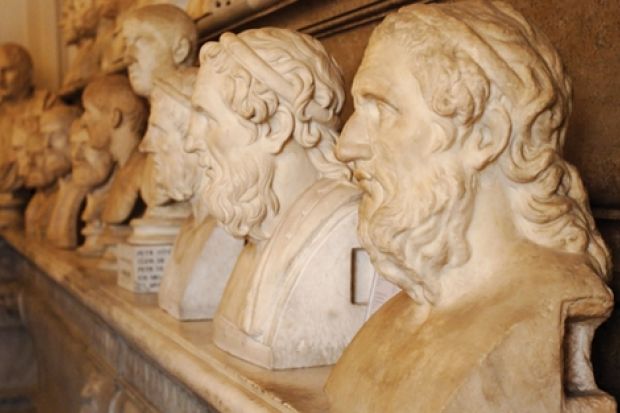What does it take to save a university Classics department - a student sit-in perhaps, or an exposition of the virtues of the discipline by particularly erudite academics?
Both probably help, but supporters of the threatened department of Classics and philosophy at Royal Holloway, University of London hope a bit of stardust might too.
Among the celebrities to have joined a campaign to save it are TV presenter Stephen Fry, Private Eye editor Ian Hislop and Colin Dexter, the creator of Inspector Morse.
The college is currently consulting on plans to merge Classics with its history department, which it is feared could spell the end for the institution's BA in Classics.
Nearly 3,000 people have signed an online petition against the reforms, while another 4,000 have signed up to the "Save Classics at Royal Holloway" Facebook page.
In a robust defence of liberal arts education circulated by the campaign organisers, Mr Fry says: "If (Royal Holloway) wants to change from education to vocation, then fine. But let no one be surprised when generation after generation emerge like robots, dedicated and adapted to one set of tools, while the liberating power of an educated mind ... is denied them."
Royal Holloway alumni including Norman Baker, Liberal Democrat MP for Lewes; Valerie Vaz, Labour MP for Walsall South; Baroness Fookes of Plymouth and the soprano Dame Felicity Lott have also opposed the proposed changes.
Going public
The very public campaign follows a row earlier this summer over the handling of negative publicity surrounding the proposals.
Paul Layzell, Royal Holloway's principal, appealed to staff using Facebook to keep any arguments over the reforms within the institution.
Edith Hall, Royal Holloway professor of Classics and English, who is leading the campaign, rejected his request. "Intellectual culture and precipitate decisions behind closed doors do not mix," she said.
However, could the high-profile campaign backfire and further alienate university management? Other departments at Royal Holloway also facing possible cuts, including modern languages and computing, have declined to speak to the media.
Mary Beard, professor of Classics at the University of Cambridge, said "the Classics campaigners are probably right to go big and public. The (principal) was holding a pistol to their heads. If they had just played it quiet, they would have got shot."
But why does Classics attract quite such fervent support?
"There is a long history of perceived attacks on Classics, and a long history of effective mobilisation," Professor Beard said. "After all, the Classical Association was founded in 1903 because they thought that Classics was under threat."
Christopher Pelling, Regius professor of Greek at the University of Oxford, said Classics graduates were often particularly loyal to their subject. "If this campaign brings home how many potential friends such policies are alienating, all well and good - though one would have hoped that this wouldn't have needed to be made evident to the administration in quite so clear-cut a way."
A spokesman said the college wanted to "secure the long-term future of Classics" amid falling interest in the subject, adding that degrees would continue in classical studies and ancient history, including ancient languages.
"The department operates at a considerable deficit and would need twice as many students as it currently has just to correct this."
Register to continue
Why register?
- Registration is free and only takes a moment
- Once registered, you can read 3 articles a month
- Sign up for our newsletter
Subscribe
Or subscribe for unlimited access to:
- Unlimited access to news, views, insights & reviews
- Digital editions
- Digital access to THE’s university and college rankings analysis
Already registered or a current subscriber?
